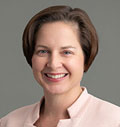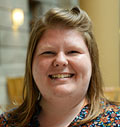A Q&A with the DFMCH Incident Response Team
On February 5, 2020, UW Health reported its first case of COVID-19. By March 23, Governor Tony Evers issued a Safer at Home order as cases in Wisconsin topped 400. As positive tests mounted, DFMCH assembled an incident response team to tackle the changing protocols and guidelines to keep our patients and staff safe. In this issue, they share their experiences.
William Schwab, MD
Interim Chair
What were your greatest challenges?
Seeking to assure common ground among the many segments and people within our department in a context of the sudden inability to gather in person and the need to learn to communicate more effectively through virtual means. This was challenging as we had to adapt to substantial disruptions in our workplace structures, huge changes in our clinical realm, and major transformations in how we provide education, sustain community health efforts, do research, and maintain the administrative infrastructure of our department.
Where did you find strength and inspiration?
The tremendous support of people in the department. We have nurtured each other through extraordinary times of fear, loss, and change. Our staff, faculty, and learners have shown extraordinary kindness and insight in addition to remarkable professionalism. I am deeply grateful for that.
What have you learned?
Greater comfort in sharing uncertainty. I’m impressed by how willing people are to accept that there may not always be clear answers, but that as long as there is openness and a commitment to integrity we can make good judgements together and move forward.
Sandra Kamnetz, MD
Vice Chair for Clinical Care
What were your greatest challenges?
Working at home at warp speed and not being able to see people. It was very hard to make decisions that I was not use to making, like going to war. Not what I planned for when attending medical school.
Where did you find strength and inspiration?
My strength is meditation daily, biking and gardening to get away from the computer.
What have you learned?
That this large organization can change on a dime—it never did before. I was glad I had been working with our new service chiefs. Without them, it would have been impossible.
Kirsten Rindfleisch, MD
Associate Vice Chair for Clinical Care
What were your greatest challenges?
The pace of change, the volume of information and the degree of uncertainty were certainly the greatest challenges for clinical care in the early weeks of the pandemic. As we’ve transitioned into a more chronic phase, finding updated approaches to effective communication has become an important area for focused improvement.
Where did you find strength and inspiration?
First, the memory of Beth and imagining how she would maintain focus on helping patients, communities, providers and staff through this crisis. Then, the incredible dedication, integrity and compassion that I saw every hour of every day from the staff and providers in our clinics.
What have you learned?
Our organization and others across the US can be incredibly nimble and innovate rapidly in the face of great need. I hope we can continue to leverage this terrible opportunity to transform our healthcare system to make it work better for everyone, especially communities where health is so dramatically affected by racism, poverty and other systemic factors.
Ildi Martonffy, MD
Residency Program Director
What were your greatest challenges?
Making sure we were doing what was best for everyone – colleagues, patients – in the face of rapidly changing information and local and national public health guidelines. Many times, we did not have the option to wait for more or “better” information and just had to decide and act on things.
Where did you find strength and inspiration?
A triathlon coach I know responds with “and we can do hard things” when someone says something is hard. Our healthcare colleagues in places like New York have been working more grueling hours making much tougher decisions than we have had to make. As for inspiration, witnessing the kindness COVID has brought out in so many people in our community has been amazing.
What have you learned?
So, so much. Probably the most important thing is the power of communication even when we don’t have all the answers. People need to and want to know what is going on, even when it is changing hour by hour.
 Stacey Lansing
Stacey Lansing
Administrative
Program Specialist
What were your greatest challenges?
Getting myself up to speed with clinical care. My colleagues on the response team are all practicing physicians, and my background is in communications and event planning. They had a common language and shared practical experience to draw from to which I had to orient myself. The upside is that being immersed in their world meant that I learned very quickly. I’ve always had an interest in medicine, so it was fascinating to get not only a deep dive into the epidemiology of the virus, but a truly comprehensive look at how the pandemic touched every aspect of our organization from direct patient care to incoming medical students.
Where did you find strength and inspiration?
Knowledge is power. Things are a lot less scary and stressful when you understand what’s going on, and knowing that our department and the organization at large were being really proactive and transparent with ever-evolving information instilled a lot of confidence. I was also really impressed by all the people throughout DFMCH that stepped up to make the transition to our new normal as smooth as possible, from the clinic providers that were willing to go where they were needed most to the staff who are reaching out remotely to make sure people feel connected through things like shared lunches over video and virtual gratitude cards.
What have you learned?
So much! Serving on our response team was a crash course in crisis planning, health care administration, and all the complex workings of our department. I feel like I got five years’ worth of experience in five weeks. I also learned that I could offer a unique viewpoint from a patient and community perspective – it’s important to have different voices at the table when dealing with complex issues.
Published: September 2020





 Stacey Lansing
Stacey Lansing